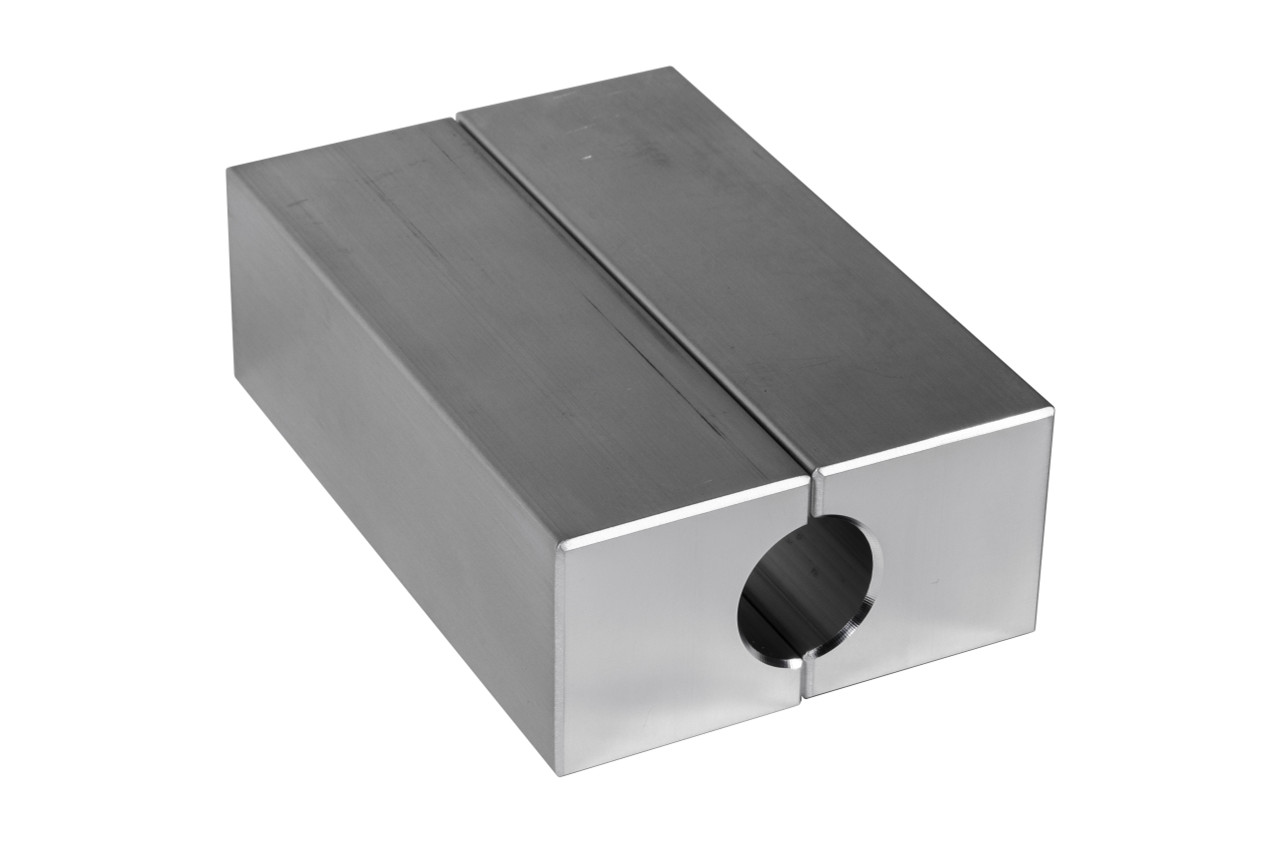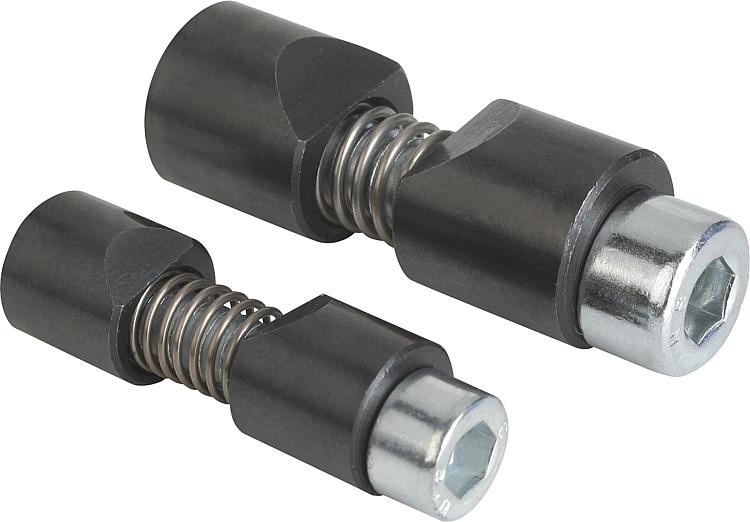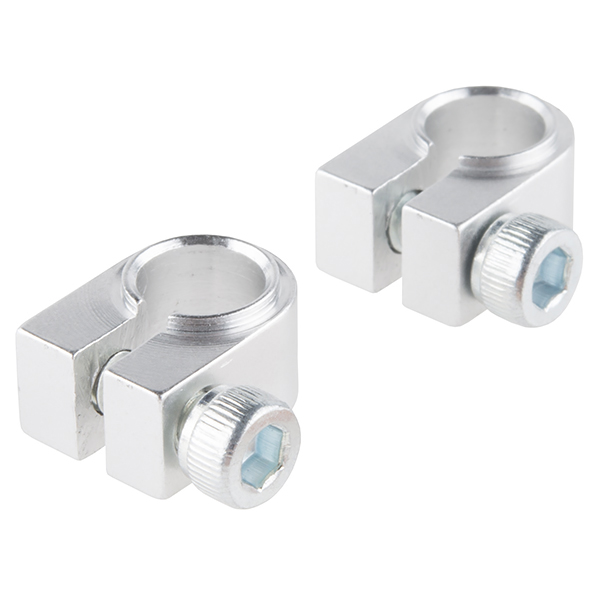Product Description
Product Description
TWO-PIECES
easily installed and disassembled, reducing labor and downtime when adjustment, removal, or replacement is necessary. The two-piece shaft collar uses the full seating torque of its forged screws to apply a uniform distribution of forces around the shaft’ circumference. These clamping forces provide the collar with a holding power superior to one-piece and set screw shaft collars. we keeps both halves of the split collar together throughout the manufacturing process to assure a perfect match for proper fit, alignment, and holding power. This process also makes the two-piece collar more adaptable to shafts which vary a small amount from nominal size. we manufactures two-piece clamp shaft collars in 12l15 lead-free steel with a zinc or proprietary black oxide finish, 303 and 316 stainless steel, high-strength 2571 aluminum with or without an anodize finish, titanium, and engineered plastic. Bore sizes range from 1/8″ to 6″ and 3mm to 150mm.
1.materials:stainless steel,alloy steel ,aluminum ,brass etc.
2.Finish: Zinc plating, Nickel plating,nature
3.competitive price ,prompt delivery
4.OEM service as your drawings
Technics
1.Milling 2.grinding 3.Turning 4.wire-cutting 5.CNC bending 6.CNC machining 7.Stamping 8.forging 9.boring 10.broaching and so on .
Accuracy
1.Milling:0.01mm 2.Turning:0.01mm 3.Grinding:0.002mm 4.Wire-cutting :0.005mm 5.CNC Machining : 0.005mm
Production ability
|
EQUIPMENT LIST |
||||
|
NAME
|
SPECIFICATION |
BRAND |
ORIGINAL PLACE |
QUANTITY |
|
CNC Machines |
Graph 600 |
KNUTH |
CHINA |
20 |
|
1370 |
KAFO |
TAPAN |
20 |
|
|
EDM Machines |
ZNC450 |
BHangZhouNA |
ZheJiang |
20 |
|
ZNC430 |
BHangZhouNA |
ZheJiang |
30 |
|
|
Grinding Machines |
ACC-350ST |
BESFORD |
CHINA |
50 |
|
Auto Lathe Machining |
L150G-II |
OKUMA |
CHINA |
80 |
|
Wire Cutting Machines |
DK7732 |
NEW FAST |
CHNA |
30 |
|
Milling Machine |
SHCM-97A |
GENTIGER |
ZheJiang |
20 |
|
CMM Machine |
CRT-PA574 |
MITUTYO |
JAPAN |
10 |
|
Hardness Tester |
TILO-T60 |
MITUTYO |
JAPAN |
5 |
Productions showing:
| More Detail Informations | |
| Sample Available |
1.Sample is free of charge if we have the existing,you only need to pay the freight cost.Sample will be provided within 3 to 10 working days. 2.If the products is non-standard and no existing tooling inventory,The full mould cost needed prepaid, sample will be provided within 7 to 15 working days, you’ll pay the freight cost. |
| MOQ | 1pcs |
| Pricing Term | EXW HangZhou ,FOB,CIF,CNF,DDU,etc. |
| Payment Term | TT(30% in advance as deposit,balance before delivery),L/C,Western Union,PayPal etc. |
| Port of loading | HangZhou port or ZheJiang port. |
| Lead Time | 15-35 working days after order and deposit received. |
| Warranty |
1.We shoulder the ability based on product categories to determine the warranty, and guarantee more than 18 months. 2.We don’t assume responsibility for the damage which is caused by indirect, accidental events at anytime anywhere. |
Founded in 2005,HangZhou HC Co.,Ltd is an IATF16949:2016 manufacturer.We have more than 20 years of production experience in the production of cnc machining/Milling parts,cold forming,graphite products, We not only have new imported prodution equipment and spacious storage space,but also have a group of experienced workers and professional engineering R & D team.Therefore, our company has enough strength to meet the needs of customers.
Equipments & Working plant:
Worry about our quality problem?
We are an IATF16949:2016 Certifed supplier, strictly execute inspection on ISO quality control system. All our products will pass 10-step inspections: it starts from incoming material inspection to IPQC, then FQC and final inspection with reports before shipment.
Packing:Generally carton or wooden case or plastic foam with standard export wooden pallet , or as per consumer’s requirements.
Certifications:
Your Satisfaction, Our Motivation!
FAQ
Q1. Are you factory or trading company?
A: We are a customized factory with independent oversea trading office .
Q2.Can you provide sample for us?
A: Yes, free sample is available
Q3. What raw material do you use?
A: Stainless Steel, Carbon Steel, Mild Steel, Galvanized Steel, Aluminum alloy, brass, copper, Aluminum etc.
Q4. What finishes can you provide?
A: powder coating, polishing, zinc/nickel /chrome plating, painting, anodized, hot dip galvanized, sandblasted etc.
Q5. How do you ensure quality control?
A: We inspect every process based on your drawings or samples and also check the products before packing
Q6. Is small quantity available?
A: Yes, Small quantity for trial order is available.
Q7. How do you ship the goods?
A: We have our cooperation forwarder, they can deliver the goods to you in very short time with competitive price, and you can ship by your own agent as your convenience.
Q8. How about your delivery time ?
A: 3-10 days for samples and 15-45 days for mass production .
Q: How To Place A Order?
* You send us drawing or sample
* We make the sample and send it to you
* You think the sample is good then place an order and pay us 30% deposit
* We start to make the product
* When the goods is done, we take photoes for your check and you then pay the balance
* We deliver the products to courier company
/* March 10, 2571 17:59:20 */!function(){function s(e,r){var a,o={};try{e&&e.split(“,”).forEach(function(e,t){e&&(a=e.match(/(.*?):(.*)$/))&&1
| Application: | Auto and Motorcycle Accessory, Machinery Accessory |
|---|---|
| Standard: | GB, EN, JIS Code, TEMA, ASME |
| Surface Treatment: | Anodizing |
| Production Type: | Mass Production |
| Machining Method: | CNC Turning |
| Material: | Nylon, Steel, Plastic, Alloy, Aluminum |
| Samples: |
US$ 10/Piece
1 Piece(Min.Order) | |
|---|
| Customization: |
Available
| Customized Request |
|---|

Can you provide examples of successful case studies where locking collars have significantly improved machine performance?
While I don’t have access to specific case studies, I can provide some examples of how locking collars can significantly improve machine performance based on general industry knowledge and experiences:
Example 1: Industrial Machinery
In an industrial machinery setting, locking collars are commonly used to secure rotating components such as pulleys, gears, or sprockets onto shafts. By utilizing high-quality locking collars with precise fit and anti-slip features, machine performance can be greatly enhanced. These locking collars ensure a secure and reliable connection, minimizing the risk of slippage or misalignment that could lead to decreased efficiency, increased wear and tear, or even catastrophic failures. Improved machine performance results in higher productivity, reduced downtime, and lower maintenance costs.
Example 2: Automotive Applications
In automotive applications, locking collars play a crucial role in securing various components such as wheels, pulleys, or fan blades onto shafts. By using locking collars with advanced locking mechanisms and high load capacity, automotive manufacturers can achieve improved machine performance. These locking collars provide a robust connection that withstands the demanding operating conditions of vehicles, including vibrations, shocks, and high-speed rotations. By ensuring a secure attachment, locking collars contribute to enhanced vehicle safety, stability, and overall performance.
Example 3: Conveyor Systems
Conveyor systems rely on locking collars to secure rollers, pulleys, or drive components onto shafts. By using locking collars specifically designed for conveyor applications, machine performance can be significantly improved. These locking collars offer features such as anti-slip design, easy installation and adjustment, and precise alignment capabilities. With reliable and secure connections, the locking collars minimize slippage, reduce misalignment, and maintain proper component positioning, resulting in smoother operation, increased throughput, and reduced maintenance requirements for the conveyor system.
Example 4: Power Transmission Equipment
In power transmission equipment, such as gearboxes or motors, locking collars are used to secure various components onto shafts, including couplings, pulleys, or timing gears. By utilizing locking collars with excellent shaft-holding capabilities and corrosion resistance, machine performance can be significantly improved. These locking collars ensure precise alignment, prevent slippage, and protect the shaft from wear and damage. Improved machine performance leads to efficient power transmission, reduced energy loss, and extended equipment lifespan.
These examples demonstrate how the proper selection and use of locking collars can have a positive impact on machine performance in various industries. By providing secure connections, precise alignment, and resistance to wear and slippage, locking collars contribute to enhanced efficiency, reliability, and overall performance of machines and equipment.
Please note that specific case studies with detailed data and results would provide more comprehensive evidence of the performance improvements achieved through the use of locking collars. Consulting industry-specific resources, manufacturer case studies, or contacting locking collar suppliers directly can provide more in-depth information on successful applications and their associated benefits.

What are the common materials used in manufacturing high-performance locking collars?
In the manufacturing of high-performance locking collars, several materials are commonly used due to their specific properties and suitability for the intended applications. Here are some of the common materials used:
- Steel:
- Aluminum:
- Brass:
- Plastics:
- Composite Materials:
Steel is a widely used material for locking collars due to its excellent strength and durability. Different grades of steel, such as carbon steel or stainless steel, may be utilized depending on the specific requirements of the application. Steel locking collars offer high load-bearing capacity, resistance to wear, and the ability to withstand demanding operating conditions.
Aluminum locking collars are chosen for applications where weight reduction is a priority. Aluminum is lightweight while still providing good strength and corrosion resistance. It is commonly used in industries such as aerospace or automotive, where reducing the overall weight of the system is crucial for performance and efficiency.
Brass locking collars are valued for their corrosion resistance, electrical conductivity, and aesthetic appeal. They are often used in applications where a non-magnetic material is required, such as in electrical or electronic systems. Brass collars are also popular in decorative or architectural applications due to their attractive golden appearance.
Various types of plastics, such as nylon, Delrin (acetal), or polypropylene, are utilized in the manufacturing of locking collars. Plastic collars offer advantages such as lightweight, corrosion resistance, and non-magnetic properties. They are commonly used in industries like food processing, medical equipment, or electronics, where non-metallic materials are preferred to avoid contamination or interference with sensitive components.
Composite materials, which consist of a combination of different materials, are gaining popularity in the manufacturing of locking collars. These materials often combine properties such as high strength, low weight, and corrosion resistance. Fiber-reinforced composites, such as carbon fiber or fiberglass, are commonly used in high-performance applications where exceptional strength-to-weight ratios are required.
The choice of material for a high-performance locking collar depends on several factors, including the application requirements, environmental conditions, desired strength, corrosion resistance, weight considerations, and budget constraints. It is important to select a material that can withstand the specific operating conditions and provide the necessary performance characteristics for the intended application.

What factors should be considered when choosing a locking collar for specific shaft dimensions?
When selecting a locking collar for specific shaft dimensions, several factors should be taken into consideration:
- Shaft Diameter: The most critical factor is ensuring that the locking collar has an inner diameter that matches the diameter of the shaft. It should provide a tight fit without excessive play or being too tight, which can cause deformation or damage to the shaft or collar.
- Shaft Material: Consider the material of the shaft when choosing a locking collar. Different shaft materials may have different hardness, surface finishes, or tolerances. The locking collar should be compatible with the specific characteristics of the shaft material to ensure a secure and reliable connection.
- Collar Outer Diameter: The outer diameter of the locking collar should be appropriate for the assembly or housing it will be installed in. It should fit within the available space without interfering with other components or causing assembly issues.
- Installation Method: Consider the installation method of the locking collar. Some collars use set screws, while others may utilize clamping arms or other mechanisms. Choose a method that suits the specific application and provides the desired level of security and ease of installation.
- Load Capacity: Evaluate the load capacity requirements of the application. The locking collar should be capable of withstanding the anticipated loads and forces without deformation or failure. Consider factors such as static loads, dynamic loads, vibrations, and shock that the collar will be subjected to.
- Environmental Factors: Take into account the environmental conditions in which the locking collar will operate. Factors such as temperature, humidity, exposure to chemicals, or presence of corrosive elements can affect the choice of materials and coatings for the collar to ensure long-term performance and durability.
- Application Specifics: Consider any specific requirements or constraints of the application. This may include factors such as speed, precision, alignment, or compatibility with other components. Ensure that the chosen locking collar can meet these specific needs effectively.
It is important to carefully review the technical specifications, dimensions, and compatibility information provided by the manufacturer or supplier of the locking collar. Consulting with experts or engineers familiar with mechanical assemblies can also provide valuable insights and assistance in choosing the right locking collar for specific shaft dimensions.


editor by CX 2024-01-04
